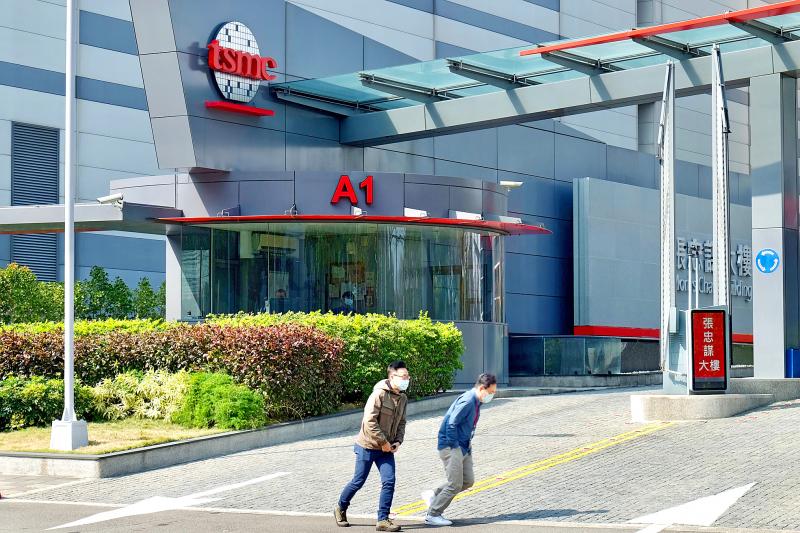Taiwan Semiconductor Manufacturing Co (TSMC, 台積電) was on Thursday set to sell local currency bonds, as it prepared for a spending blitz amid a global chip shortage.
The world’s largest contract chipmaker planned to price about NT$16 billion (US$565.25 million) of notes in three parts in an auction, though the actual issuance size might change.
The manufacturer would have to contend with a recent rise in rates globally that has sent many corporate bond yields up from record lows in the past few weeks.

Photo: Sam Yeh, AFP
The debt offering comes at a promising time for the semiconductor industry as the world scrambles its way through the shortfall for the key components in everything from smartphones to TVs and vehicles.
US President Joe Biden’s administration has pressed Taiwan, home to the largest semiconductor manufacturing sector in the world, to help resolve a shortfall of auto chips that has idled some auto plants.
TSMC last month announced that its outlay for capital expenditure this year could total as much as US$28 billion, up from US$17 billion last year.
The staggering sum would help expand its technological lead and fund construction of a planned US$12 billion fab in Arizona.
The company’s board approved a plan this month to raise up to NT$120 billion of unsecured corporate bonds in Taiwan, as well as the provision of a guarantee to a unit for dollar note issuance of up to US$4.5 billion.
“TSMC needs funds to build its US factory,” and it might decide later in the year to increase its debt issuance plans, Capital Securities Corp (群益金鼎證券) trader Baker Tu (涂瑞勝) said.
Concerns about extra future bond supply from the company could dampen demand for Thursday’s offering, he said.

Application-specific integrated circuit designer Faraday Technology Corp (智原) yesterday said that although revenue this quarter would decline 30 percent from last quarter, it retained its full-year forecast of revenue growth of 100 percent. The company attributed the quarterly drop to a slowdown in customers’ production of chips using Faraday’s advanced packaging technology. The company is still confident about its revenue growth this year, given its strong “design-win” — or the projects it won to help customers design their chips, Faraday president Steve Wang (王國雍) told an online earnings conference. “The design-win this year is better than we expected. We believe we will win

Intel Corp chief executive officer Lip-Bu Tan (陳立武) is expected to meet with Taiwanese suppliers next month in conjunction with the opening of the Computex Taipei trade show, supply chain sources said on Monday. The visit, the first for Tan to Taiwan since assuming his new post last month, would be aimed at enhancing Intel’s ties with suppliers in Taiwan as he attempts to help turn around the struggling US chipmaker, the sources said. Tan is to hold a banquet to celebrate Intel’s 40-year presence in Taiwan before Computex opens on May 20 and invite dozens of Taiwanese suppliers to exchange views

Chizuko Kimura has become the first female sushi chef in the world to win a Michelin star, fulfilling a promise she made to her dying husband to continue his legacy. The 54-year-old Japanese chef regained the Michelin star her late husband, Shunei Kimura, won three years ago for their Sushi Shunei restaurant in Paris. For Shunei Kimura, the star was a dream come true. However, the joy was short-lived. He died from cancer just three months later in June 2022. He was 65. The following year, the restaurant in the heart of Montmartre lost its star rating. Chizuko Kimura insisted that the new star is still down

While China’s leaders use their economic and political might to fight US President Donald Trump’s trade war “to the end,” its army of social media soldiers are embarking on a more humorous campaign online. Trump’s tariff blitz has seen Washington and Beijing impose eye-watering duties on imports from the other, fanning a standoff between the economic superpowers that has sparked global recession fears and sent markets into a tailspin. Trump says his policy is a response to years of being “ripped off” by other countries and aims to bring manufacturing to the US, forcing companies to employ US workers. However, China’s online warriors